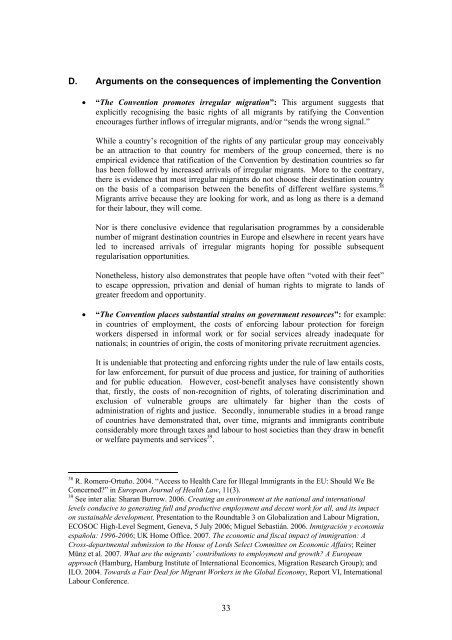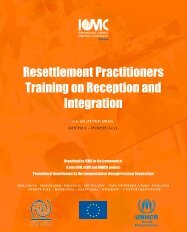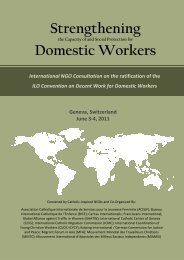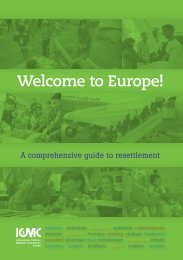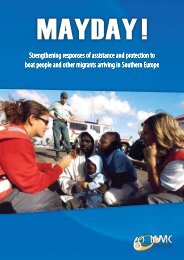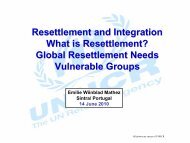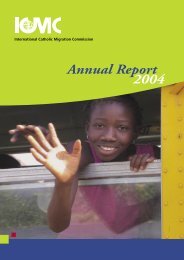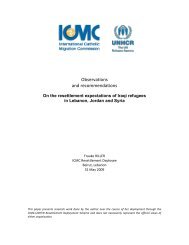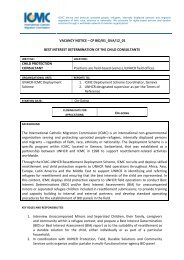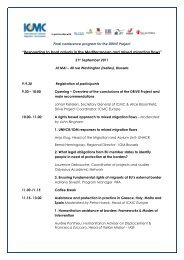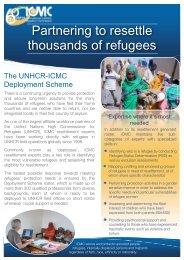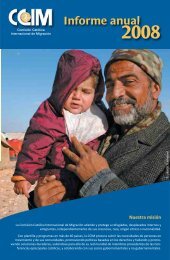Guide on ratification of the Migrant Workers Convention
Guide on ratification of the Migrant Workers Convention
Guide on ratification of the Migrant Workers Convention
You also want an ePaper? Increase the reach of your titles
YUMPU automatically turns print PDFs into web optimized ePapers that Google loves.
D. Arguments <strong>on</strong> <strong>the</strong> c<strong>on</strong>sequences <strong>of</strong> implementing <strong>the</strong> C<strong>on</strong>venti<strong>on</strong><br />
• “The C<strong>on</strong>venti<strong>on</strong> promotes irregular migrati<strong>on</strong>”: This argument suggests that<br />
explicitly recognising <strong>the</strong> basic rights <strong>of</strong> all migrants by ratifying <strong>the</strong> C<strong>on</strong>venti<strong>on</strong><br />
encourages fur<strong>the</strong>r inflows <strong>of</strong> irregular migrants, and/or “sends <strong>the</strong> wr<strong>on</strong>g signal.”<br />
While a country’s recogniti<strong>on</strong> <strong>of</strong> <strong>the</strong> rights <strong>of</strong> any particular group may c<strong>on</strong>ceivably<br />
be an attracti<strong>on</strong> to that country for members <strong>of</strong> <strong>the</strong> group c<strong>on</strong>cerned, <strong>the</strong>re is no<br />
empirical evidence that ratificati<strong>on</strong> <strong>of</strong> <strong>the</strong> C<strong>on</strong>venti<strong>on</strong> by destinati<strong>on</strong> countries so far<br />
has been followed by increased arrivals <strong>of</strong> irregular migrants. More to <strong>the</strong> c<strong>on</strong>trary,<br />
<strong>the</strong>re is evidence that most irregular migrants do not choose <strong>the</strong>ir destinati<strong>on</strong> country<br />
<strong>on</strong> <strong>the</strong> basis <strong>of</strong> a comparis<strong>on</strong> between <strong>the</strong> benefits <strong>of</strong> different welfare systems. 38<br />
<strong>Migrant</strong>s arrive because <strong>the</strong>y are looking for work, and as l<strong>on</strong>g as <strong>the</strong>re is a demand<br />
for <strong>the</strong>ir labour, <strong>the</strong>y will come.<br />
Nor is <strong>the</strong>re c<strong>on</strong>clusive evidence that regularisati<strong>on</strong> programmes by a c<strong>on</strong>siderable<br />
number <strong>of</strong> migrant destinati<strong>on</strong> countries in Europe and elsewhere in recent years have<br />
led to increased arrivals <strong>of</strong> irregular migrants hoping for possible subsequent<br />
regularisati<strong>on</strong> opportunities.<br />
N<strong>on</strong>e<strong>the</strong>less, history also dem<strong>on</strong>strates that people have <strong>of</strong>ten “voted with <strong>the</strong>ir feet”<br />
to escape oppressi<strong>on</strong>, privati<strong>on</strong> and denial <strong>of</strong> human rights to migrate to lands <strong>of</strong><br />
greater freedom and opportunity.<br />
• “The C<strong>on</strong>venti<strong>on</strong> places substantial strains <strong>on</strong> government resources”: for example:<br />
in countries <strong>of</strong> employment, <strong>the</strong> costs <strong>of</strong> enforcing labour protecti<strong>on</strong> for foreign<br />
workers dispersed in informal work or for social services already inadequate for<br />
nati<strong>on</strong>als; in countries <strong>of</strong> origin, <strong>the</strong> costs <strong>of</strong> m<strong>on</strong>itoring private recruitment agencies.<br />
It is undeniable that protecting and enforcing rights under <strong>the</strong> rule <strong>of</strong> law entails costs,<br />
for law enforcement, for pursuit <strong>of</strong> due process and justice, for training <strong>of</strong> authorities<br />
and for public educati<strong>on</strong>. However, cost-benefit analyses have c<strong>on</strong>sistently shown<br />
that, firstly, <strong>the</strong> costs <strong>of</strong> n<strong>on</strong>-recogniti<strong>on</strong> <strong>of</strong> rights, <strong>of</strong> tolerating discriminati<strong>on</strong> and<br />
exclusi<strong>on</strong> <strong>of</strong> vulnerable groups are ultimately far higher than <strong>the</strong> costs <strong>of</strong><br />
administrati<strong>on</strong> <strong>of</strong> rights and justice. Sec<strong>on</strong>dly, innumerable studies in a broad range<br />
<strong>of</strong> countries have dem<strong>on</strong>strated that, over time, migrants and immigrants c<strong>on</strong>tribute<br />
c<strong>on</strong>siderably more through taxes and labour to host societies than <strong>the</strong>y draw in benefit<br />
or welfare payments and services 39 .<br />
38 R. Romero-Ortuño. 2004. “Access to Health Care for Illegal Immigrants in <strong>the</strong> EU: Should We Be<br />
C<strong>on</strong>cerned?” in European Journal <strong>of</strong> Health Law, 11(3).<br />
39 See inter alia: Sharan Burrow. 2006. Creating an envir<strong>on</strong>ment at <strong>the</strong> nati<strong>on</strong>al and internati<strong>on</strong>al<br />
levels c<strong>on</strong>ducive to generating full and productive employment and decent work for all, and its impact<br />
<strong>on</strong> sustainable development, Presentati<strong>on</strong> to <strong>the</strong> Roundtable 3 <strong>on</strong> Globalizati<strong>on</strong> and Labour Migrati<strong>on</strong>,<br />
ECOSOC High-Level Segment, Geneva, 5 July 2006; Miguel Sebastián. 2006. Inmigración y ec<strong>on</strong>omía<br />
española: 1996-2006; UK Home Office. 2007. The ec<strong>on</strong>omic and fiscal impact <strong>of</strong> immigrati<strong>on</strong>: A<br />
Cross-departmental submissi<strong>on</strong> to <strong>the</strong> House <strong>of</strong> Lords Select Committee <strong>on</strong> Ec<strong>on</strong>omic Affairs; Reiner<br />
Münz et al. 2007. What are <strong>the</strong> migrants’ c<strong>on</strong>tributi<strong>on</strong>s to employment and growth? A European<br />
approach (Hamburg, Hamburg Institute <strong>of</strong> Internati<strong>on</strong>al Ec<strong>on</strong>omics, Migrati<strong>on</strong> Research Group); and<br />
ILO. 2004. Towards a Fair Deal for <strong>Migrant</strong> <strong>Workers</strong> in <strong>the</strong> Global Ec<strong>on</strong>omy, Report VI, Internati<strong>on</strong>al<br />
Labour C<strong>on</strong>ference.<br />
33


